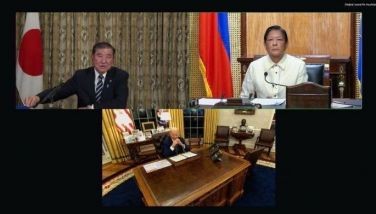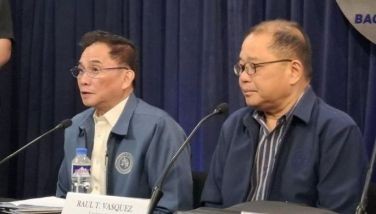BSP monitoring Abu bank deposits
May 28, 2002 | 12:00am
The Bangko Sentral ng Pilipinas will be monitoring bank deposits in Mindanao that are suspected of being owned by Abu Sayyaf bandits, BSP Gov. Rafael Buenaventura assured yesterday.
Buenaventura made the assurance as the newly created Anti-Money Laundering Council, which he chairs, met with Department of Justice officials to ask for lawyers to assist the AMLC in prosecuting suspected money launderers.
The meeting was attended by Justice Secretary Hernando Perez, Securities and Exchange Commission chairman Lilia Bautista and Chief State Prosecutor Jovencito Zuño.
The BSP chief stressed, however, that Republic Act No. 9160, or the Anti-Money Laundering Law, only allows the AMLC to investigate bank accounts that appear to have suspicious movements or have come from illegal sources.
"If there were movements after the law was enacted (on Sept. 30, 2001), then we can check and monitor these. But if it was done before the passage of the law, then we can’t," he said.
Buenaventura also reiterated that only accounts opened after the passage of RA 9160 could be covered by the law, making it difficult to investigate accounts that were used by Abu Sayyaf terrorists who kidnapped 21 tourists from Malaysia.
The Abu Sayyaf kidnapped 21 guests from an island resort in Sipadan, Malaysia on April 23, 2000, brought them to their strongholds in Sulu and demanded millions of dollars in ransom. Some foreign journalists were also seized as they were covering the incident.
With the help of Malaysian officials and the Libyan ambassador to Manila, the hostages were released in batches after ransom was paid by the victims’ relatives and the Libyan government.
Justice Undersecretary Jose Calida confirmed that monetary authorities have noted an upsurge in peso and dollar deposits in banks in Jolo, Sulu as well in banks in nearby Basilan and Zamboanga City.
"We received information that the rates of deposits in these areas have increased tremendously. So that means money is flowing into the banks. I think the upsurge was during the Sipadan incident," Calida said.
"The deposits increased soon after ransom payments were made. Unfortunately, we had no law yet on money laundering at that time," he said.
"We will coordinate with the AMLC to look into this matter because we don’t believe that suddenly there was an economic miracle in that part of the country," Calida added.
"If there is probable cause then we can ask the court to allow the AMLC to examine the accounts," he said.
Perez had earlier confirmed intelligence reports from the US Federal Bureau of Investigation (FBI) that the Abu Sayyaf are channeling a part of the ransom money to the al-Qaeda network of international terrorist Osama bin Laden.
He said the amount of money being sent to Bin Laden was "apparently significant."
"We were told that perhaps money already here in the hands of terrorists are going towards the way of Bin Laden. I am referring to the Abu Sayyaf in Mindanao," Perez said.
Buenaventura made the assurance as the newly created Anti-Money Laundering Council, which he chairs, met with Department of Justice officials to ask for lawyers to assist the AMLC in prosecuting suspected money launderers.
The meeting was attended by Justice Secretary Hernando Perez, Securities and Exchange Commission chairman Lilia Bautista and Chief State Prosecutor Jovencito Zuño.
The BSP chief stressed, however, that Republic Act No. 9160, or the Anti-Money Laundering Law, only allows the AMLC to investigate bank accounts that appear to have suspicious movements or have come from illegal sources.
"If there were movements after the law was enacted (on Sept. 30, 2001), then we can check and monitor these. But if it was done before the passage of the law, then we can’t," he said.
Buenaventura also reiterated that only accounts opened after the passage of RA 9160 could be covered by the law, making it difficult to investigate accounts that were used by Abu Sayyaf terrorists who kidnapped 21 tourists from Malaysia.
The Abu Sayyaf kidnapped 21 guests from an island resort in Sipadan, Malaysia on April 23, 2000, brought them to their strongholds in Sulu and demanded millions of dollars in ransom. Some foreign journalists were also seized as they were covering the incident.
With the help of Malaysian officials and the Libyan ambassador to Manila, the hostages were released in batches after ransom was paid by the victims’ relatives and the Libyan government.
Justice Undersecretary Jose Calida confirmed that monetary authorities have noted an upsurge in peso and dollar deposits in banks in Jolo, Sulu as well in banks in nearby Basilan and Zamboanga City.
"We received information that the rates of deposits in these areas have increased tremendously. So that means money is flowing into the banks. I think the upsurge was during the Sipadan incident," Calida said.
"The deposits increased soon after ransom payments were made. Unfortunately, we had no law yet on money laundering at that time," he said.
"We will coordinate with the AMLC to look into this matter because we don’t believe that suddenly there was an economic miracle in that part of the country," Calida added.
"If there is probable cause then we can ask the court to allow the AMLC to examine the accounts," he said.
Perez had earlier confirmed intelligence reports from the US Federal Bureau of Investigation (FBI) that the Abu Sayyaf are channeling a part of the ransom money to the al-Qaeda network of international terrorist Osama bin Laden.
He said the amount of money being sent to Bin Laden was "apparently significant."
"We were told that perhaps money already here in the hands of terrorists are going towards the way of Bin Laden. I am referring to the Abu Sayyaf in Mindanao," Perez said.
BrandSpace Articles
<
>
- Latest
- Trending
Trending
Latest
Trending
Latest
Recommended

































